Hey ladies, an interesting and thought provoking guest post on the blog today regarding wedding guests and the use of cameras / iPhones etc at your wedding… In the grand scheme of wedding planning is this something you’ve even thought about and if so, are any of the following points a concern?
Guest Post by Emily Buchanan of Howling Basset
To those not in the know, the title of this post might seem pretty obscure. Who is Uncle Bob? How does one unplug a wedding? It is not being amplified. It is not an acoustic set. The bride is not connected by a wire to a socket in the wall. Indeed, these are all legitimate quandaries, and ones that I shall clarify.
Since the digital revolution enveloped the entire world, everyone (including your wedding guests) gained access to 24-hour-connectivity. This, inevitably, led to the exposure of people’s private lives and, unpredictably, the contemporary culture of cataloguing life online. These days, it seems, memory is worth nothing unless validated by image.
Unfortunately, this validation of memory, alongside economic cameras, iPhones and amateur guests with semi pro gear, is going to have a very real impact on your wedding. In the last decade, the professional photographer’s plight has become a constant struggle.
Queue Uncle Bob. Scrutinised on pro-photography forums and chastised to the extreme, “Uncle Bobs” (as they’re known in the industry), are those busy-body guest photographers with the best intentions. They are not professional photographers, they are professional photo-bombers, and unnaturally capable of ruining a well-constructed shot. Sure, it’s great that guests want to steal a few images for their Facebook profile, but when this begins to hinder the quality of the portraits you’ve spent good money on, it’s time to reconsider.
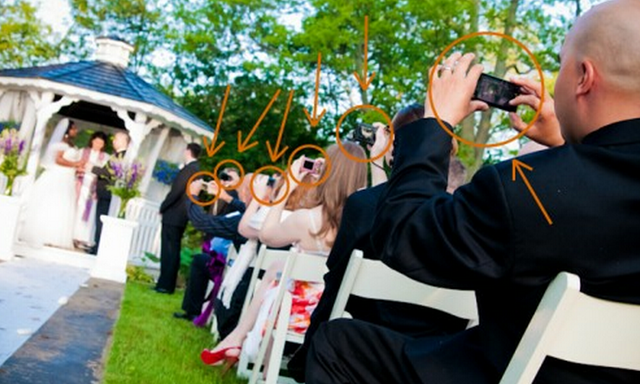
After all, those candid, reportage-style pictures that everyone’s been looking forward to may well be hijacked by glaring lenses and the dead-pan faces of loved ones inspecting their LCD screens. It begs the question: how can a guest be truly present if they are distracted by the snazzy machine in their hands? No one can truly say they are engaged in a moment when looking through a lens. Not to mention the fact that, instead of one camera on the bride, there’s now likely to be dozens. Unless one feels confident enough to be unfazed by a day of celebrity status, a retiring bride may well find herself overwhelmed by the force of the flash.
So what’s the answer? In some cases, the professional wedding photographer has changed their contract to avoid Uncle Bob and the increasing difficulty of capturing faces. The contract not only states that they own the sole rights to photograph the wedding, but that their images cannot be shared through social media platforms. This, of course, removes the problem of unaccredited image sharing and puts pressure on guest to buy prints (bearing in mind that it isn’t easy being a professional photographer these days, so those prints become bread-and-butter).
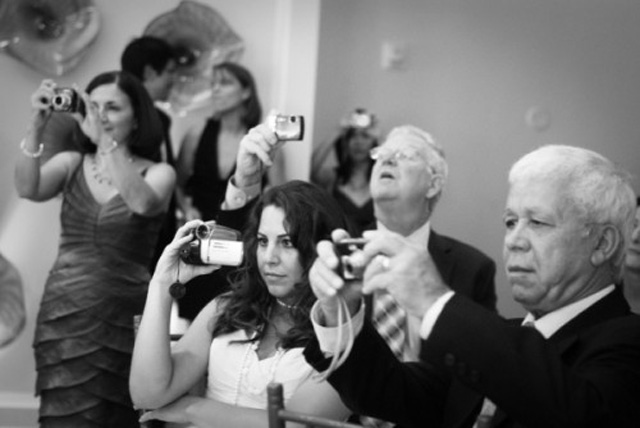
Comparatively, some have argued that no good can come from restricting the guests’ license to document their own lives, not just that of the bride-grooms. And in any case, the act of taking a picture represents a memorable moment, and that can only be a pleasure and privilege, right?
Evidently, it’s a complicated issue and one that isn’t going to be resolved easily. However, there is a growing trend amongst savvy bride-grooms to warn their guests straight off the bat. Increasingly, wedding invitations are adorned with the word ‘unplugged,’ followed by a polite request…
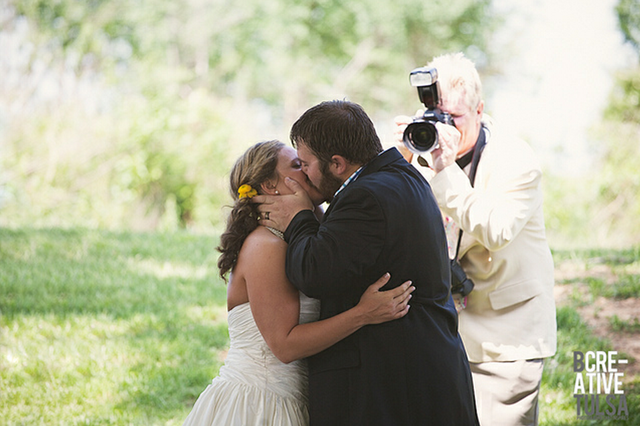
‘We are honoured to have you joining us on this special day, which is why we want you to enjoy yourself without the burden of modern technology. Therefore, we’ve hired a professional photographer to capture the day for everyone and we’ll be sharing these images with you as soon as we can. To make the photographer’s job easier, please respectfully refrain from using your camera at the wedding. We only get to do this once and we want it to be perfect. Thank you!’
Which, when you put it like that, is fair enough. It’s been known for bride-grooms to include an Uncle Bobbed image in the invitation, as an illustration of what they do not want. But is this enough to restrain snap-happy family members and could it be considered passive aggressive? Or, are you of the opinion that it’s your wedding and your guests should be sensitive to your needs?
So my lovelies, this is a huge, huge subject and we haven’t yet touched on the social media aspect… your wedding photos could be on on fb by the end of the day!
Does this lack of control scare the crap out of you? Do you feel pressured about being under the digital spotlight? Are you concerned your guests may get in the way of great photography?
Would you unplug your wedding?
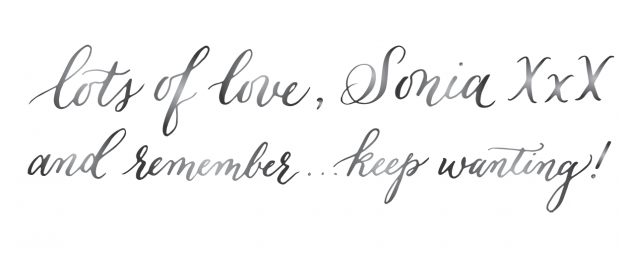
Photo credits captions:
Image 1 – Nora & Troy Photography at www.noraandtroy.com
Image 2 – Jeff Seltzer https://jeffseltzerphotography.com/
Image 3 – ‘Just Say No to Uncle Bob’ Bcreative Tulsa bcreativetulsa.com
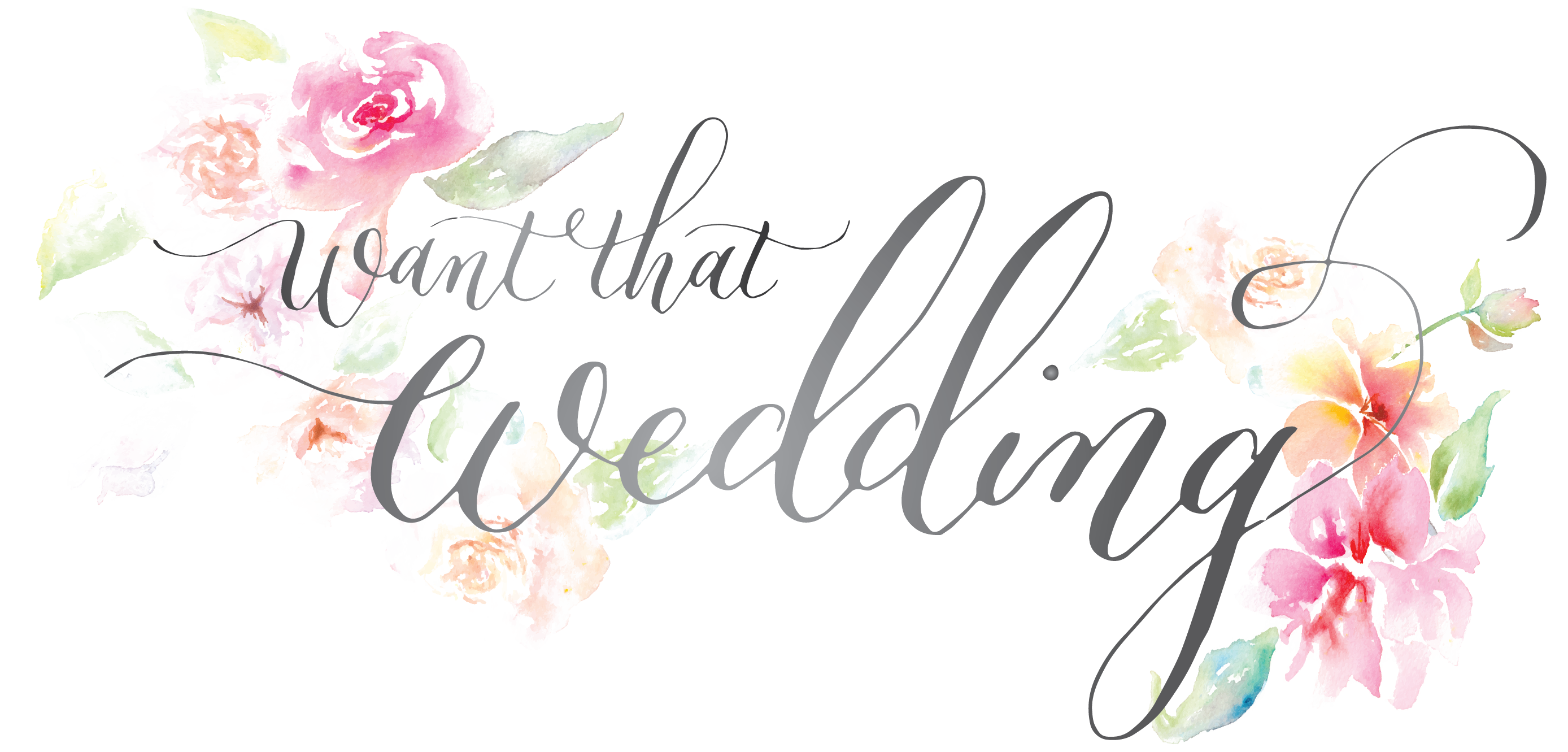

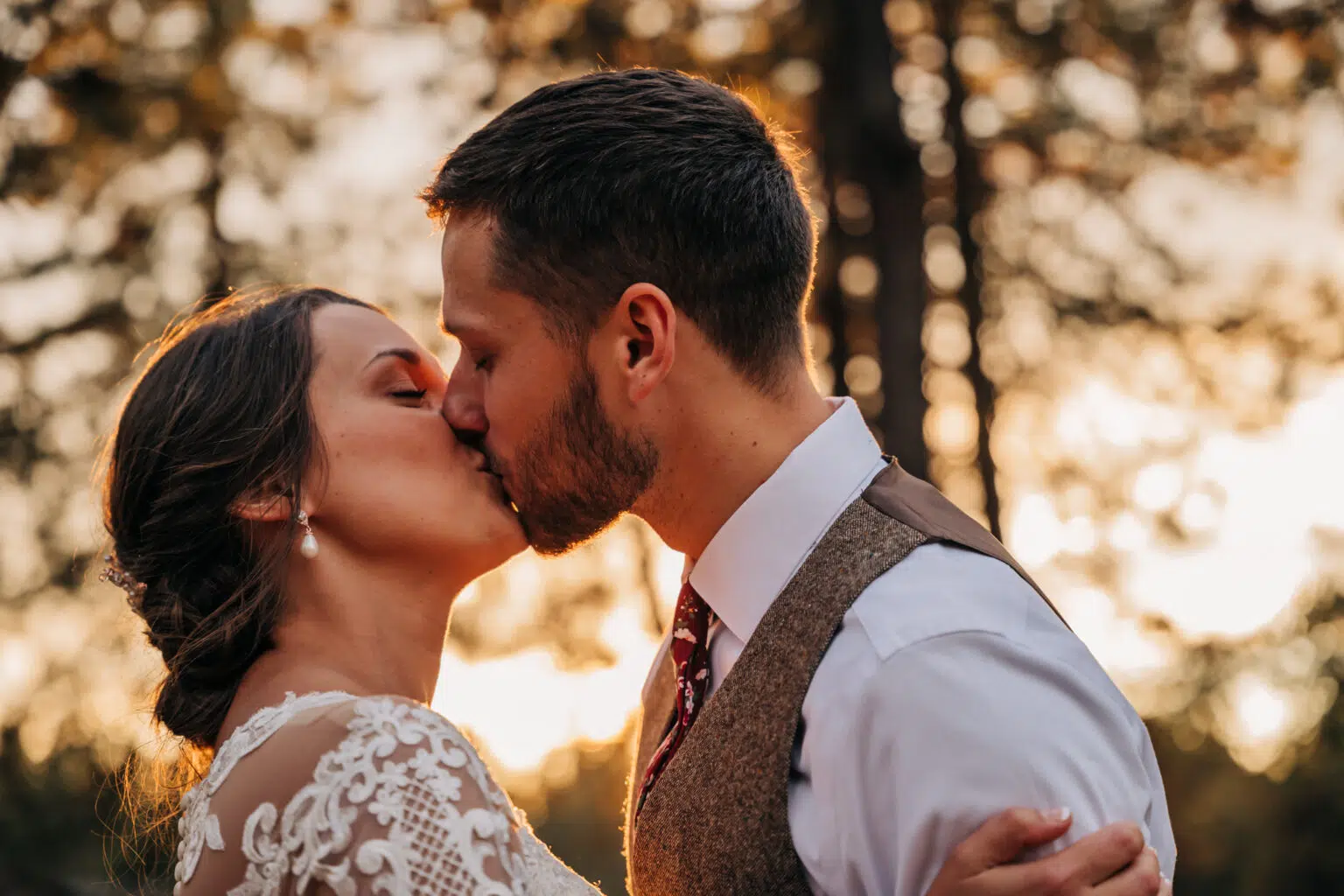
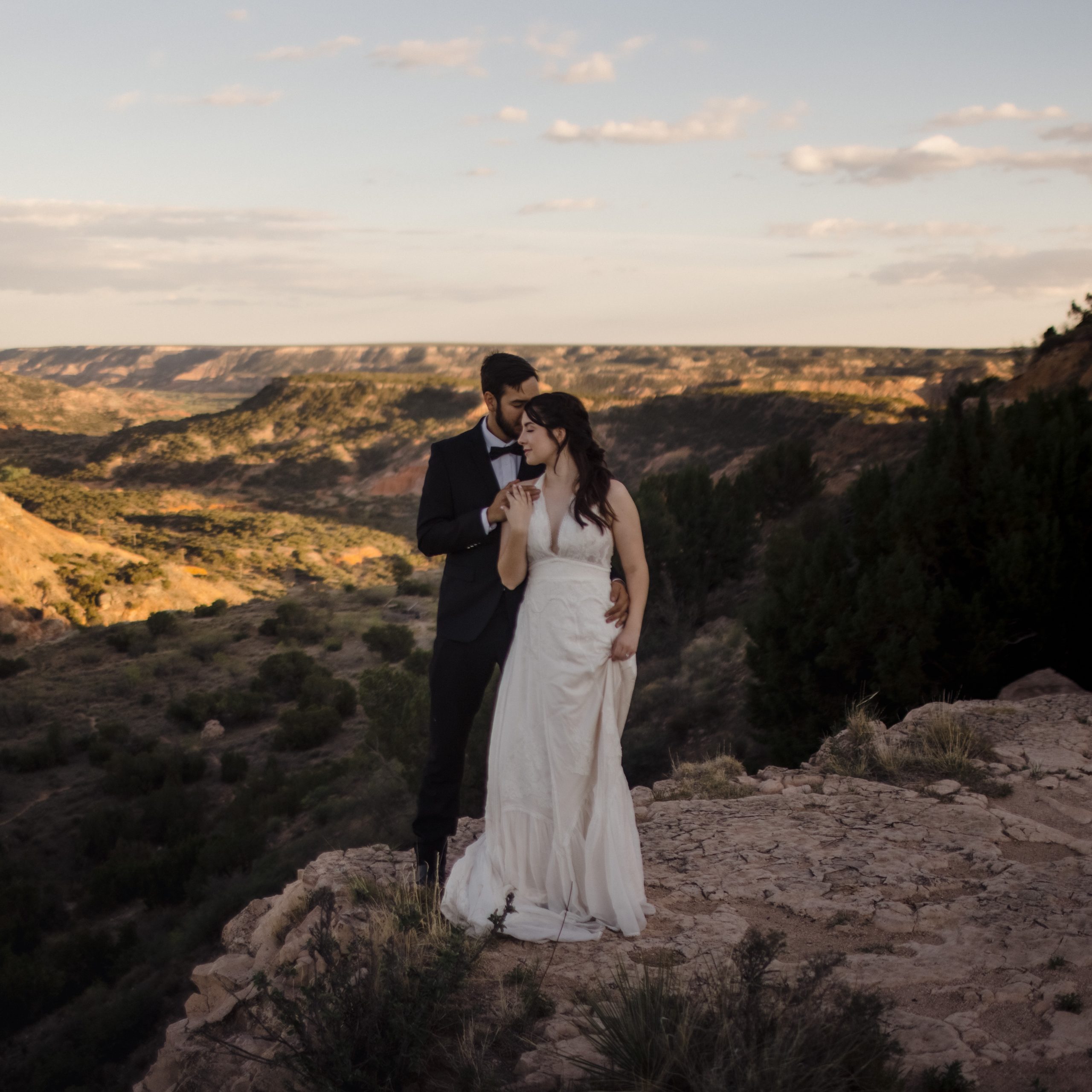
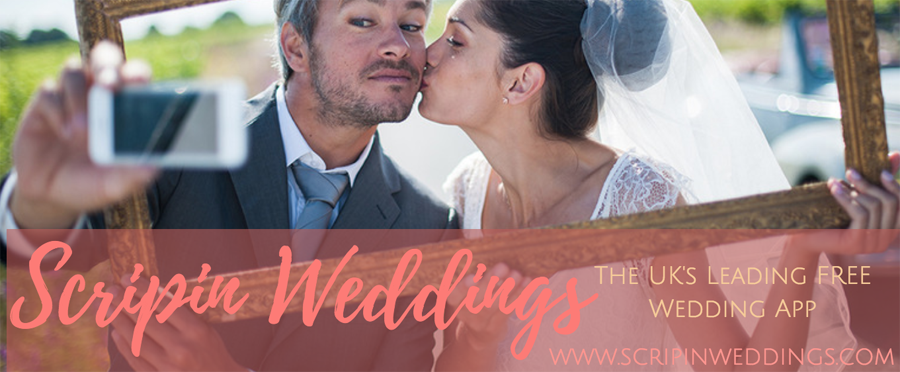

Great advice and I’m glad the unplugged trend is growing. Several weddings I’ve photographed recently have been ‘unplugged’ and it’s great for people to really be in the moment rather than seeing it through a screen. The photos are posted online after the wedding and guests can see the images from the ceremony. You can either enjoy an event & experience it or record it; not both.
Yuck! How precious. If this were an editorial shoot, then of course you control every element – but you shouldn’t be getting married just to get a set of perfect pics. You are sharing the day with the people you love most and who love you – and yes, they will want to take photos.
Most “plugged in” weddings have dozens and dozens of great shots to use. Some of them may have been uncle bobbed, but plenty won’t. The desire to micromanage the free will and impulses of others makes them seem like extras in your wedding shoot.
If I were a wedding guest being told I couldn’t take snaps, I’d be really offended – I might not want the pics the photog takes. I want the pics of my friend pulling a silly face, or my sister looking exactly like our mum – and a pro probably won’t be looking for those shots. If I was then told I had to buy pro photos online, I’d be outraged. Isn’t attending a wedding expensive enough?
Seriously, of an overkeen amateur is getting in the back of a special shot, have a word. If the whole crowd has their iPhones out, then that’s part of the day – include it, blur it out, get a new angle…
What an interesting take on it. I think you make a lot of sense Spangleflower!
I can understand the sentiment. Given the experience of my own wedding where countless pictures of my various gormless faces were uncritically uploaded to facebook and now as a wedding photographer, seeing the poor bride and groom being mobbed mercilessly as soon as they’re pronounced man and wife. There is a point where you think ‘sheesh, just leave it to the professionals!’. However, there will be loads of moments that your photographers won’t capture – 1 or 2 people cannot be observing each of your guests simultaneously for every smile, and they shouldn’t have to. If I was to advise anyone to be the perfect guest, snap one or two of the couple (seriously, they will be covered) and then spend the rest of the day taking pictures of what it’s like to be at the wedding from your perspective – the guest pictures I enjoyed the most were of my friends messing about when I wasn’t looking! An outright ban? A bit extreme I think.
It’s an interesting thought having an ‘unplugged’ wedding but I have to admit I love taking a few cheeky photos at weddings & I am guilty of chucking them up on facebook etc. I would never be so crass as to take pictures during the service or to get in the way of the professional photographers. I think stopping your guests from takings pics could mean you miss some real candid moments that the photographer might not see or be around for. I can’t wait to see all of the funny, dodgy, daft, precious and comedy moments my friends and family will take on our wedding day – the more the merrier I say!
Spangleflower and Rachel, the unplugged movement is mainly about the service itself. If folks want to spend the rest of the wedding looking though a viewfinder then fine, but the ceremony at least should be participated in and with. Dispassionately viewing special moments through an LCD screen makes you an observer, not a participant. You also don’t have to buy the images – you can view them online, the same way you would with friend’s photos.
I’m unplugging my wedding. It’s my day, I’ve spent thousands of pounds and most of my life planning this thing I want it to be exactly the way I’ve dreamed. I don’t want all of my friends and family distracted by their cameras or lost in pictures. I especially don’t want my wedding uploaded online – it’s so tacky! If the guests don’t like that then they need to seriously access why they’re even coming.. it’s my wedding day after all. I totally agree with this article and I think I’ll even pinch the unplugged request to put in my programmes, is that okay?
The article is talking about unplugging the whole day, isn’t it? And most registrars and celebrants ask that there are no photos during the vows, or official photos only – so what would be the need for this “movement”?
If, as the article discusses, the whole day is unplugged, then yes, I can view watermarked photos on a photographer’s website – but that’s not the same way I experience the rest of my photographic memories – which these days is candid snaps on Facebook. Then next january I’ll make a photo book of a whole years’ snaps, to look at in the future. I’m completely into protecting pro photogs’ copyright – but equally I’m not going to be paying for photos id have pteferred to take myself. So my annual photo album just won’t have pics of those weddings. Nice.
When I read this yesterday it really bothered me on a number of levels. Anyone who has seen posts I’ve contributed to in the past will know I’m a strong believers in getting a good quality wedding photographer and I would never condone a decision to use an amateur at your wedding, But the attitude here really bugged me.
First of all any professional photographer should be used to dealing with guests taking photos, they should be able to communicate with guests and ensure they don’t ‘get in the way’ of the photographs the couple want. That’s part of what makes them a professional, right?
By banning people taking pictures your not only censoring guests from capturing they want of you and your partner but of anyone else they want to take a picture of during the day. With many couples now choosing not to have any formal shots taken how can guests have their own record of the day they spent with you. Unless you are going to split your photographer into 20 how can they possible capture every moment of the day? Guests want pictures not only of the couple but of the day they have with their friends and family. Why deny someone of this? It’s just selfish and makes you look vain.
So what if someone posts a less than flattering picture of you on Facebook? If you’re that vain you can’t bear to have a bad wedding posted then just un-tag yourself. You will always have your professional photos of the day to look back on so what does it matter that someone took a badly framed shot, with dodgy flash on their compact camera. You know that the person who took that picture just pointed and pressed a button and probably didn’t really know what they were doing. The photo is likely to be crap but at least they cared enough to want to capture it.
Also worst case scenario what happens if something happens to the pros photos and an SD gets lost of corrupted and you lose a whole chunk of the day? The chances of this a pretty remote I grant you but if it’s going to happen it will be the wedding where guests were banned from taking photos. I would have very little sympathy I’m afraid.
I think this article is really well balanced. She addresses both schools of thought and concludes by questioning the whole act of ‘unplugging.’ I don’t think she’s condoning it, merely offer up the debate. Which seems to have worked.
‘In any case, the act of taking a picture represents a memorable moment, and that can only be a pleasure and privilege, right?’ This is exactly what you’ve written, ‘The photo is likely to be crap but at least they cared enough to want to capture it.’
I wouldn’t do it and I would be a bit bummed if I wasn’t allowed to take photos at a friends wedding!
I was shooting a group once and about 8 others rocked up with their cameras and started calling, I just let them do it and started shooting them :D
I will be unplugging my wedding ceremony.I recently went to a colleagues wedding, and most of the guests were paying more attention to their phones and the pictures taken than the actual ceremony. This made my decision even more concrete.
I invited my guests to be part of my wedding, to witness myself and my partner taking our vows. I didn’t invite them to worry about if they are managing to get a picture of us/seeing if they can take it fast enough to get a shot of me walking down the aisle.
I want them to enjoy the ceremony and keep it sacred, I don’t want everyone with the phone/ipad/camera pointing at me. I want them to watch and listen as I marry the person I want to spend the rest of my life with. Once the ceremony is over they are fine to snap away, but till then no cameras, just eyes please!
People are becoming ever dependent on their cameras to support their brain in recalling important memories. So much so that they forget to actually live in the moment of enjoyment because they are so busy taking photographs. One is comforted by the press of a shutter, that memory is apparently now safe in the bank never to be forgotten.
As said above, I think the unplugged movement is better geared towards the ceremony (including the recessional) and perhaps family portraits. I think it’s a great idea, but make sure the guests of the wedding know that it’s the B&Gs decision and not the photographer’s, because the guests may end up hating on the photographer.
As the bride and groom walk down the aisle they want to look at their 50-100 friends and family in the eye not their camera lens.
After that, so long as there is communication in advance that the photography needs priority over the family photos and other key events (cake cutting, first dance etc.) then guests should be able to take as many photos as they like – so long as the couple aren’t hounded paparazzi style. Any guest should also comply to the couple’s wishes if they don’t want photos of them on Facebook or other places on the internet.
hmmmmm, food for thought! We will be placing some wording in either/both the invite and the order of service, but making it clear that there will be some opportunity to take pictures aftr the ceremony and obviously people can take whatever snaps they like during dinner etc.
‘Banning’ guests a bit extreme? Perhaps, but the fact that couples are now considering it and in some cases carrying it through probably tells us that this issue is becoming a problem. Last year I wrote piece on my blog about the same thing: https://www.lloyddobbie.com/2011/06/taking-part-or-just-watching/
Abbie says above that professional photographers should be used to dealing with guests with cameras and indeed we are, it’s part of the job. However, I find there is a big difference between guests with iPhones etc snapping away at each other looning about and the keen hobbyist (I hesitate to use the pejorative term, ‘Uncle Bob’) with their bag of kit who insists on following the commissioned photographer around whilst declaring that “I won’t get in your way”.
You could argue that the professional is there to record the day as it happens and guests with cameras is ‘what’s happening’ but, make no mistake, a glut of cameras at a wedding will compromise the professional coverage. Usually it’s not too drastic but there will be ‘lost’ shots here and there. At the end of the day the professional will either adjust the composition whilst shooting or during post processing and, hopefully, the clients won’t notice what could have been.
Comments are closed.